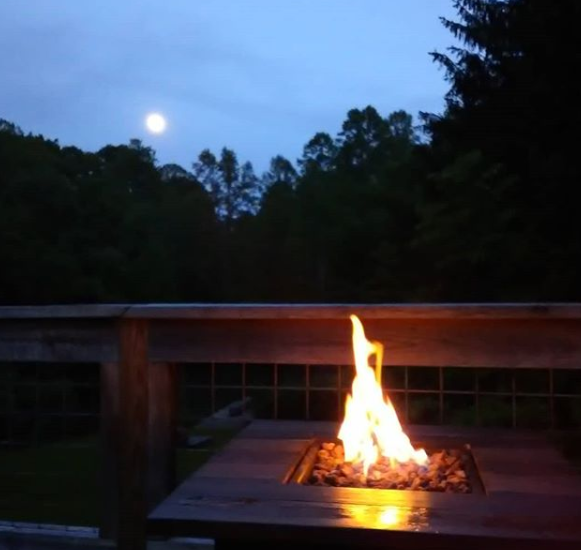How We Made Over $5,000 in 6 Months as Airbnb Hosts
Real estate doesn’t have to be a burden just because you have a mortgage. There are ways to make it feel like an asset, not a liability. For Patrick and me, that meant finding a house we loved in our budget that had a second home on the property we could use as an Airbnb. And in our first six months of operating, we’re just shy of grossing $5,500 from our efforts.
Of course, getting to this point wasn’t a straightforward journey. It took us eight months after we sold our first house to find our current place, which came complete with a fully functioning tiny house at the front of the property.
It was a lot of work (and living in a lot of tiny Airbnbs with three kids and a dog), but now that things are rolling, we’re happy we waited to buy the perfect place.
Since we began hosting our Airbnb in March, our expected earnings through October total $5,497.
Since we don’t pay a separate mortgage on the tiny house, that translates into a pretty high profit margin. Here’s more on how we got started and how we currently manage our tiny house Airbnb rental
Income Snapshot
While we were fairly confident the Airbnb would be a success over time, both Patrick and I were surprised at how quickly we started getting bookings — and it hasn’t slowed down since. Here’s a month-by-month snapshot of our earnings.
To be fair, we live in a small touristy town known for bluegrass music and a strong community of artists and potters. A little bit of chatting around with friends and locals before we bought our place revealed that the Airbnb market had not yet been saturated in the area. Plus, there’s only one small, independent hotel so during the popular summer and fall months, it’s hard for visitors to find lodging. With a competitive price and a prime location, it’s been a fantastic recipe for success.
What Happens When You Don’t Check Your Airbnb Host Account
After launching our listing in March, we kind of forgot about it for a few days. I randomly logged on to see if we’d gotten any views and to my surprise, I saw we had a booking for the next weekend!
Rookie Mistake to Avoid: We should have installed the Airbnb app on our phones right away, along with opting into email alerts!
At that point, the tiny house was almost ready to go, but it still needed quite a few odds and ends to truly come together before our guests arrived. Patrick and I hustled to get it done, then enlisted the help of my parents to stay the night before our first guests to see what details were missing for an enjoyable stay. I definitely recommend doing this to iron out any kinks in the process.
In fact, we dodged a major bullet by finding an abandoned mouse nest under one of the stovetop burners! What a fire hazard that would have been! The tiny house had been empty for almost a year so we really had to go over everything with a fine tooth comb and thank goodness we did.
Luckily, we got through that first booking without a hitch and our guests had an amazing time. From there, we continued to get solid bookings just about every weekend, and some longer periods as well.
Our income has been pretty consistent throughout the spring and summer. Our occupancy rate is only 31% but that’s because we live in a place that’s known as a weekend getaway rather than a full-length vacation destination. Since the tiny house is on our property, it’s nice to have a break from guests each week.
Now that we’re heading into fall (a popular season in the mountains for fall foliage viewings), we’re booking well in advance. In fact, we’re already booked for every weekend in October!
What to Expect for Airbnb Expenses
If you’re planning on purchasing or building an Airbnb property, don’t forget to incorporate all of the startup costs involved. You’ll definitely want to look at comps in the area and determine the right style and quality of your furnishings and linens. Since our tiny house has a cabin feel to it with a budget price tag, we definitely shopped that way. But it still cost us a couple thousand dollars to get all the odds and ends needed, including furniture and small appliances (coffee maker, toaster, pots and pans, etc.)
Ongoing Consumables
Also remember the amount of consumables required to run an Airbnb. People have certain expectations when they book an Airbnb. In addition to basic cooking essentials, we also keep a stock of things like local coffee, cream and sugar, teas, granola bars, and pasta. I also cut a bouquet of flowers from the garden for each guest and we leave a small package of dark chocolates from our local chocolate shop for them as well.
I recommend this guide from Afford Anything for a detailed look at all the little details you need to accommodate your guests, from towels and toilet paper to a coffee pot and other small appliances.
Airbnb Fees
Airbnb also charges a minor 3% fee for each booking. If, for example, a guest books two nights for $150, we’ll have $4.50 deducted from the total earnings for the weekend. Considering the fact that all of our rental comes through the Airbnb website, it’s a small price to pay.
Airbnb Local Rules and Regulations
Another incredibly important thing to look into is your local rules and regulations from your city or county. We had to pay a $50 license fee and also pay a 5% lodging tax to our county. That means we write a check each month for 5% of our gross revenues from the previous month. Of course, we’ll also pay federal and state income tax when the time comes, so think about how the extra income could impact your taxes.
How to Automate the Airbnb Process
When we first started out as Airbnb hosts, Patrick and I were super hands-on with every little detail. One of the best things you can do to get concrete bookings and start earning your superhost status (which we’ve done already!) is to answer messages right away. Airbnb displays your typical response time and we like to keep ours as short as possible.
We did experiment with a service that sent out canned responses every time we received a message. But we turned it off because we found that people who book Airbnb rentals like to tell you their story and ask lots of questions. The canned responses felt odd and we wound up having to go back and explain what was happening. Plus, you give a much more personal touch to the experience when you respond to someone who tells you they’re looking for a romantic getaway or are in the area to drop their kid off at college.
For us, we’ve skipped the automated replies for now, but it is something we may revisit in the future.
In the meantime, the best time-saver we’ve implemented is getting our college-age neighbor to clean the tiny house in between bookings. We still wash the sheets but it’s really taken away the workload to pay her the cleaning fee rather than working it into our own schedules. Plus, there was always a minor sense of dread with an impending arrival. Or we’d put it off and then get a last minute booking that we’d have to scramble in order to flip the place in time.
Now we have our neighbor clean right after a departure so that the place is ready for any last minute guests. She also lets us know when we’re running low on supplies. If it’s a few days ahead of the next arrival, Patrick or I will then run down the day of and turn on lights, make sure there aren’t any spiderwebs around, and deliver a fresh bouquet of flowers.
Is Being an Airbnb Host Worth It?
Overall, the Airbnb hosting experience has been a good one for us, especially since the effort has been offset by a steady stream of cash. Plus, now that we’ve outsourced the cleaning, Patrick and I cumulatively spend less than 30 minutes each week (and oftentimes far less than that) managing the property. Even most of that effort is done via messaging on the phone or picking up consumables while we’re already at the store for other things.
We’re excited to see how things continue through the fall, and then we’ll likely take a respite during the cold winter months.



